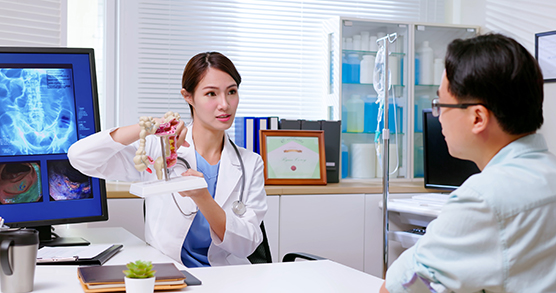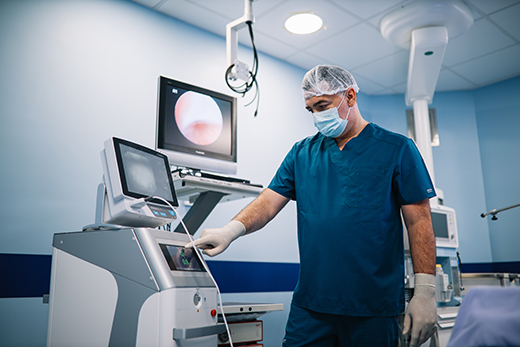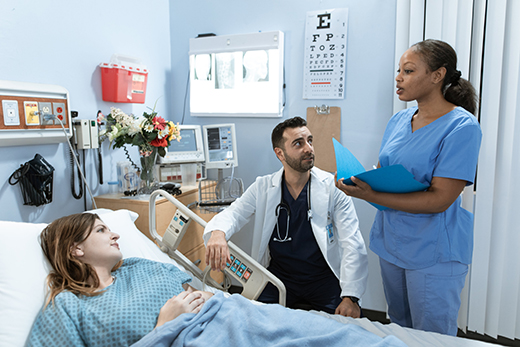Colonoscopy
Our compassionate specialists use the latest colonoscopy techniques to help prevent colorectal cancer and detect digestive tract diseases.
Medically reviewed on Nov. 13, 2023.

Leading-Edge Colonoscopy Care
At UC Davis Health, you have access to respected leaders in colorectal health. Our specialists use advanced technology and a compassionate approach that puts your comfort first.
What Can a Colonoscopy Detect?
A colonoscopy allows your provider to see inside your colon, also called your large intestine. During this procedure, our specialists guide a thin, flexible tube through your colon to look for signs of inflammation, infection or growths. Our specialists provide colonoscopy to detect:
Colorectal Polyps
A colonoscopy is the gold standard for finding and removing colorectal polyps (growths) before they become cancer. Your provider examines your entire colon and can remove polyps in the same procedure.
Diverticular Disease
Diverticular disease occurs when small pockets form inside the walls of your small intestine. Diverticulosis is the presence of these pockets, and diverticulitis is when these pockets become inflamed or infected. A colonoscopy can detect these pockets and rule out other problems, such as polyps or cancer.
Inflammatory Bowel Disease (IBD)
Inflammatory bowel disease (IBD) includes Crohn’s disease and ulcerative colitis. A colonoscopy can help your provider get detailed information about the location and severity of the condition, which guides your treatment plan.
Unexplained Bowel Symptoms
A colonoscopy helps your provider determine the cause of bowel habit changes, bleeding from your rectum or other symptoms.
Request an Appointment
As Sacramento's No. 1 hospital, you'll benefit from unique advantages in primary care and specialty care. This includes prevention, diagnosis and treatment options from experts in 150 specialties.
Referring Physicians
To refer a patient, submit an electronic referral form or call.
800-4-UCDAVIS
Patients
Call to make an appointment.
Consumer Resource Center
800-2-UCDAVIS
Why Should I Get a Colonoscopy?
Colorectal cancer is the second leading cause of cancer deaths worldwide. This cancer is also on the rise in adults younger than age 50. Colonoscopies are proven to significantly lower the rates of death from colorectal cancer.
Colonoscopies are not always for cancer screening. If you have symptoms of another bowel condition, a colonoscopy helps your provider determine your treatment.
Learn the difference between a colonoscopy and at-home colon cancer screening kits
Feeling anxious about having a colonoscopy is normal, but we’re here to help you feel as comfortable as possible. We answer all your questions and provide the highest quality care before, during and after your test. Our entire team puts your physical and emotional well-being first at every step.
-

Colonoscopy Prep
The day before your test, you will drink a liquid that empties your bowel. You can also consume other clear beverages like sports drinks, tea and black coffee. Follow your provider’s instructions to get the best results from your screening.
-

During Your Colonoscopy
You receive sedation to help you relax and medication to prevent any pain. Our gastroenterologists guide a thin, flexible tube with a camera through your colon. If any polyps are present, we may remove them. The procedure takes about one hour.
-

After Your Colonoscopy
We take you to a recovery area until you are fully awake, which usually takes one to two hours. A friend or family member must drive you home. You can eat a regular diet and return to work the next day.
Who Should Get a Colonoscopy?
The U.S. Preventive Services Task Force recommends regular colon cancer screenings for everyone ages 45 to 75. You may need to get a colonoscopy before age 45 if you have:
Family History of Colorectal Cancer or Polyps
You may have a higher risk if one of your biological parents or siblings had colorectal polyps or cancer.
Genetic Cancer Syndromes
Certain genetic conditions increase your risk of colorectal cancer, including familial adenomatous polyposis (FAP) and hereditary non-polyposis colorectal cancer (Lynch syndrome).
Inflammatory Bowel Disease (IBD)
People with IBD, including Crohn’s disease and ulcerative colitis (UC), have a greater risk of developing colorectal cancer.
Don’t Delay Your Screening
Colorectal cancer screening could save your life. If you are age 45 or older or have colorectal cancer risk factors, contact your provider to discuss when you should get screened.
“Colonoscopy,” National Library of Medicine, https://www.ncbi.nlm.nih.gov/books/NBK559274/
“Colorectal (Colon) Cancer: What Should I Know About Screening?” Centers for Disease Control and Prevention (CDC), https://www.cdc.gov/cancer/colorectal/basic_info/screening/index.htm
“Colorectal Cancer Risk in IBD,” Crohn’s & Colitis Foundation, https://www.crohnscolitisfoundation.org/science-and-professionals/education-resources/colorectal-cancer-risk-ibd

Ranked among the nation’s best hospitals
A U.S. News & World Report best hospital in cardiology, heart & vascular surgery, diabetes & endocrinology, ENT, geriatrics, neurology & neurosurgery, and pulmonology & lung surgery.

Ranked among the nation’s best children’s hospitals
U.S. News & World Report ranked UC Davis Children’s Hospital among the best in neonatology, nephrology, orthopedics*, pediatric & adolescent behavioral health, and pulmonology & lung surgery. (*Together with Shriners Children’s Northern California)

Ranked Sacramento’s #1 hospital
Ranked Sacramento’s #1 hospital by U.S. News, and high-performing in aortic valve surgery, back surgery (spinal fusion), COPD, colon cancer surgery, diabetes, gynecological cancer surgery, heart arrhythmia, heart failure, kidney failure, leukemia, lymphoma & myeloma, lung cancer surgery, pacemaker implantation, pneumonia, prostate cancer surgery, stroke, TAVR, cancer, orthopedics, gastroenterology & GI surgery, and urology.

The nation’s highest nursing honor
UC Davis Medical Center has received Magnet® recognition, the nation’s highest honor for nursing excellence.

World-class cancer care
One of ~59 U.S. cancer centers designated “comprehensive” by the National Cancer Institute.

A leader in health care equality
For the 13th consecutive year, UC Davis Medical Center has been recognized as an LGBTQ+ Healthcare Equality Leader by the educational arm of America’s largest civil rights organization.
